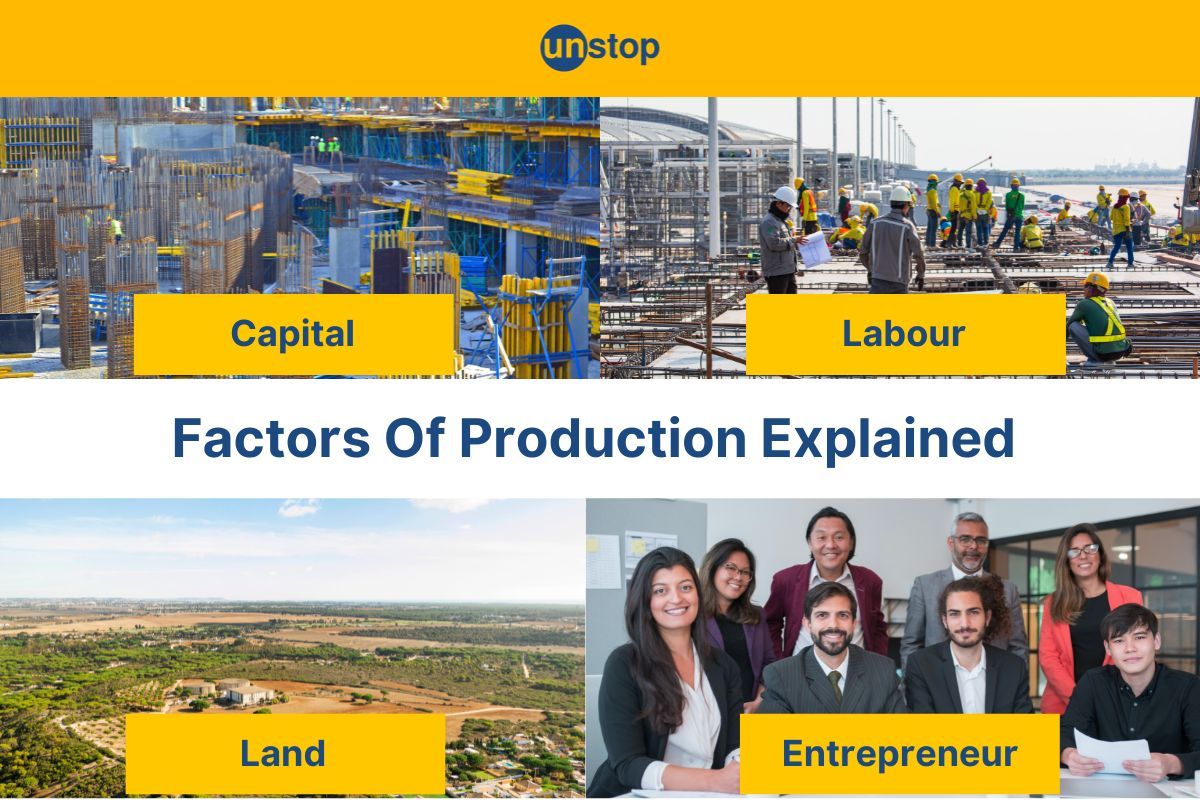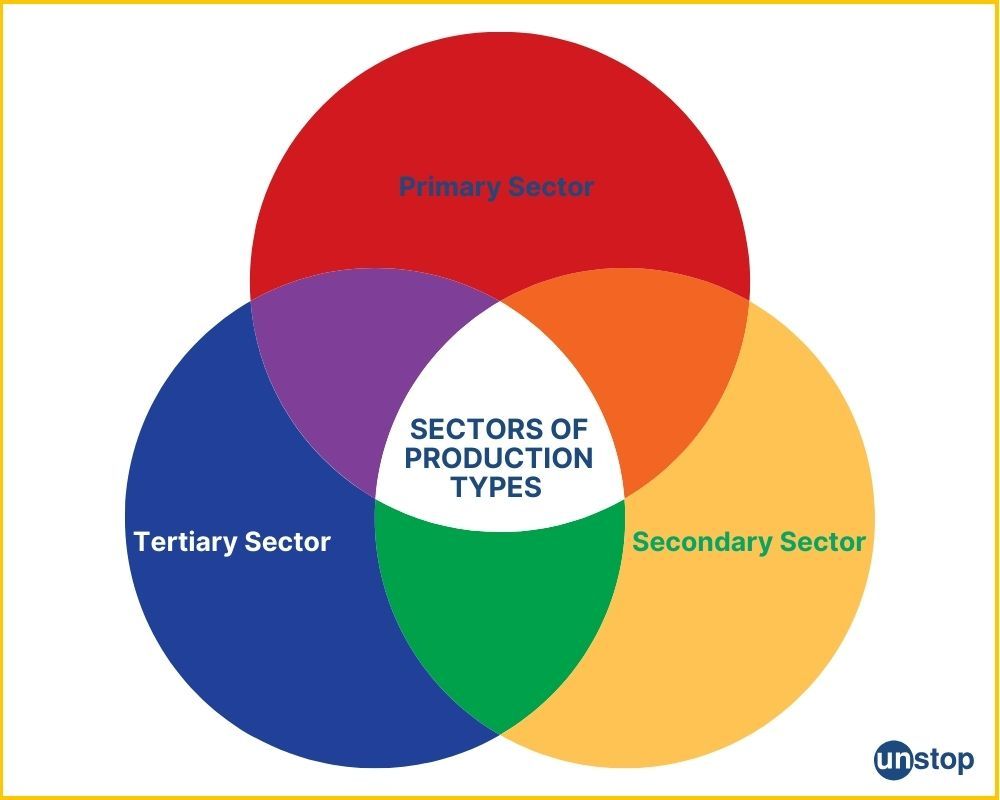- What Are Factors of Production?
- Four Factors Of Production
- Land As A Factor Of Production
- Capital As A Factor Of Production
- Entrepreneurship As A Factor Of Production
- Labor As A Factor Of Production
- Importance Of Factors Of Production
- Types Of Sectors In Factors Of Production
- Ownership Of Factors Of Production
- Frequently Asked Questions (FAQs)
Factors Of Production: Types & Importance Explained In Detail

The study of economics involves analyzing the complex web of factors that contribute to the production and distribution of goods and services. At the core of this analysis lie the factors of production - the essential resources used in the production process. These factors play an important role in determining an economy's output and growth. By comprehending the characteristics and importance of these factors, we gain valuable insights into how goods are created, industries are developed, and markets are shaped.
What Are Factors of Production?
Factors of production are the essential inputs used in the production process. The production process involves various elements that work together to create goods and services. These elements, known as the factors of production, play an indispensable role in determining the efficiency and success of any economic system.
Four Factors Of Production
The primary factors of production can be categorized into four main types: land, labor, capital, and entrepreneurship.
Land
Land refers to all natural resources which are employed in the production process. It includes not only physical land but also everything that comes with it, such as minerals, water bodies, forests, and other natural assets. The availability and quality of land can significantly impact the productivity of an economy. For example, countries rich in fertile soil may have a comparative advantage in agricultural production.
Labor
Labor represents the human effort involved in producing goods or providing services. It encompasses both physical and mental work contributed by individuals at various skill levels. The quantity and quality of labor available within an economy can greatly influence its productivity levels. Skilled workers have an edge over those unskilled ones when it comes to production due to their specialized knowledge and expertise.
Capital
Capital refers to all man-made resources used in the production process. It includes machinery, equipment, buildings, tools, technology, and infrastructure. Capital plays a vital role in enhancing productivity by enabling more efficient methods of production. For instance, advanced machinery can automate tasks or increase output per worker hour.
Entrepreneurship
Behind every innovation and economic growth, the role of entrepreneurship is unavoidable. Entrepreneurs are individuals who take risks to create new businesses or improve existing ones. They identify opportunities for profit and allocate resources accordingly.
Understanding these four factors is essential for efficient resource allocation within an economy. Each factor contributes differently to the overall production process:
-
Land provides raw materials necessary for manufacturing.
-
Labor adds value through physical or intellectual contributions.
-
Capital facilitates productive activities by providing tools and technology.
-
Entrepreneurship drives innovation and creates new business opportunities.
The combination and utilization of these factors determine the productivity levels of an economy. When all factors are effectively employed, it leads to increased output and economic growth. However, imbalances or inefficiencies in any of these factors can hinder production and economic development.
Land As A Factor Of Production
Land is one of the four factors of production, which refers to all natural resources used in the production process. It encompasses physical space, minerals, water bodies, forests, and more. Despite being limited in supply, land plays a significant role in economic activities.
Importance Of Land In Economic Activities
The utilization and management of land are crucial for economic development. The important reasons are listed below:
Resource Availability
Land provides the essential resources necessary for various industries and sectors. For instance, farmers rely on fertile land to cultivate crops and raise livestock. Industries such as mining depend on access to mineral-rich lands for extraction purposes.
Real Estate
Land serves as the foundation for real estate development. Residential areas, commercial buildings, shopping centers - all require suitable plots of land for construction. 
Image credit: Freepik
The availability and proper use of land contribute to urbanization and infrastructure growth.
Tourism Potential
Natural landscapes like mountains, beaches, and national parks attract tourists from around the world. These tourist destinations not only generate revenue but also create job opportunities within the hospitality industry.
Managing Land Resources
Given its importance in economic activities, it is essential to manage land resources effectively:
Zoning Regulations
Governments implement zoning regulations to allocate different areas of land for specific purposes. It may be for residential, commercial, or industrial use. This ensures optimal utilization and prevents haphazard development.
Conservation Efforts
Protecting natural habitats and preserving biodiversity is vital for sustainable land management. Conservation efforts include establishing protected areas or implementing sustainable farming practices that minimize environmental impact.
Land Rehabilitation
In cases where land has been degraded due to mining or other activities, rehabilitation measures can be taken to restore its productivity and ecological balance.
Land Use Planning
Proper planning helps identify suitable locations for different types of developments based on factors like accessibility and environmental impact assessments.
Challenges & Considerations
While land is a valuable resource, it also presents challenges and considerations:
Limited Supply
Land is finite, and as populations grow, the demand for land increases. This can lead to competition and conflicts over land use.
Environmental Impact
Certain land-related activities, such as deforestation or improper agricultural practices, can lead to potential damage to the environment.

Image credit: Freepik
It is essential to balance economic development with environmental sustainability.
Land Ownership
Issues related to land ownership and property rights can arise, especially in regions where land tenure systems are not well-defined or enforced.
Capital As A Factor Of Production
Capital, as a production factor, refers to man-made tools, machinery, and equipment used in the production process. It encompasses a wide range of physical assets such as buildings, vehicles, technology infrastructure, and more.
Enhances Productivity & Efficiency
One of the key roles that capital plays in the production process is enhancing productivity. By utilizing capital goods effectively, businesses can improve their efficiency and output quality. For example, advanced machinery can automate repetitive tasks and streamline operations, leading to increased productivity. This allows companies to produce more goods or services within a given timeframe.
Investing in capital also leads to economic growth and technological advancements. When businesses allocate financial capital towards acquiring new machinery or upgrading existing technology, they contribute to overall economic development. These investments drive innovation and enable companies to adopt cutting-edge technologies that further enhance productivity.
Role Of Human Capital
While physical capital is essential for production processes, human capital is equally important. Human capital refers to the attributes that a person possesses, such as knowledge, skills, experience, and abilities which contribute to the production process.
Having skilled workers who possess specialized knowledge can significantly impact the efficiency of production processes. Skilled employees are better equipped to operate complex machinery effectively and optimize its performance. They can also identify areas for improvement and implement innovative solutions.
Importance Of Investments
Investments play an important role in ensuring the availability of both physical and human capital. Companies need financial resources to acquire new equipment or upgrade existing infrastructure. Similarly, investing in employee training programs helps develop human capital within an organization. By allocating funds towards these investments, businesses can improve their competitive advantage in the market. They can stay ahead by adopting modern technologies that increase efficiency while developing their workforce's skills.
Money As A Facilitator
Money acts as a facilitator for acquiring both physical and human capital, serving as a medium of exchange allowing businesses to purchase machinery, equipment, and other capital goods.

Image credit: Freepik
It enables companies to invest in employee training programs and attract skilled workers. Without money, the acquisition of capital would be challenging. It provides the necessary liquidity for businesses to make these investments and support their production processes.
Entrepreneurship As A Factor Of Production
Entrepreneurship plays a critical role in the production process. It involves taking risks and organizing other factors, such as land, labor, and capital, for productive purposes. Entrepreneurs are the driving force behind new ventures and business opportunities.
Taking Risks & Organizing Factors
Entrepreneurship is all about taking risks and daring to step out of their comfort zones and invest their time, money, and effort into new ideas or ventures. They have the ability to identify potential opportunities that others may overlook.
The role of entrepreneurs in organizing the factors of production into a viable resource is of immense importance. They bring together land, labor, and capital to create something valuable. For example, an entrepreneur might rent office space, hire employees, and secure funding to start a new company.
Innovation & Identifying Opportunities
One of the key aspects of entrepreneurship is innovation. Entrepreneurs are constantly looking for ways to create something new or improve existing products or processes. They are not afraid to challenge traditional methods and think outside the box.
Furthermore, entrepreneurs have a keen eye for identifying business opportunities. They can spot gaps in the market where demand exists, but supply is limited. By recognizing these opportunities early on, entrepreneurs can capitalize on them and potentially achieve great success.
Driving Economic Growth Through Innovation
The impact of entrepreneurship extends beyond individual businesses; it drives economic growth at both local and national levels. Through their innovative ideas and ventures, entrepreneurs contribute to job creation, increased productivity, and technological advancements. Innovation plays an important in the development of new products and services, eventually meeting consumer needs more effectively than before. This stimulates economic activity by increasing consumer spending and attracting investment from other firms or individuals.
Moreover, entrepreneurship fosters competition within industries as they come up with innovative solutions or improved processes; existing companies must adapt or risk being left behind. This healthy competition spurs further innovation and drives economic growth.
Labor As A Factor Of Production
Labor, as a factor of production, plays a vital role in the production process, referring to the human effort exerted during the creation of goods and services. It encompasses both physical work, such as manufacturing products or operating machinery, and mental work, such as designing new technologies or analyzing data.
Efficient and skilled labor is crucial for determining productivity levels in an economy. When workers possess the necessary expertise and experience, they can contribute to higher output and economic development. On the other hand, inefficient or unskilled labor can hinder productivity and limit growth potential.
Importance Of Skilled Labor
Skilled labor refers to workers who possess specialized knowledge and abilities in their respective fields. These individuals have received training or education that enables them to perform tasks with precision and efficiency. Skilled labor is highly sought after by employers due to its numerous benefits:
Increased Productivity
Skilled workers are more proficient at their jobs, allowing them to complete tasks quickly while maintaining high-quality standards. This leads to increased productivity within industries.
Technological Advancement
Skilled labor often drives innovation by utilizing advanced technologies effectively. Their expertise allows for the adoption of new techniques and processes that can enhance productivity.
Higher Wages
Due to their specialized skills, skilled workers tend to earn higher wages compared to unskilled counterparts. This provides them with better financial stability and improves their standard of living.
Economic Growth
A workforce consisting of skilled labor contributes significantly to economic growth by attracting investments and fostering competitiveness in industries.
Efficient Labor Allocation
Efficient allocation of labor resources is essential for maximizing productivity across different sectors of an economy:
Division Of Labor: Dividing tasks among a group of workers based on their skills allows each individual to focus on specific aspects of production where they excel. This division enables specialization and increases overall efficiency.
Job Matching: Proper job matching ensures that workers are assigned specific roles according to their skills and abilities. Matching workers to suitable positions enhances productivity and job satisfaction.
Training & Education: Providing opportunities for training and education equips workers with the necessary skills to perform their jobs efficiently. Continuous learning helps them adapt to changing technologies and industry demands.
Labor Mobility: Encouraging labor mobility allows workers to move from low-productivity sectors to high-productivity sectors, leading to a more efficient allocation of resources.
Importance Of Factors Of Production
Factors of production are crucial for economic growth and development. Here's why they matter:
Creation Of Goods & Services: By combining land, labor, capital, and entrepreneurship effectively, factors of production enable businesses to produce goods that people want to buy or use.
Job Creation: The employment opportunities provided by factors of production contribute significantly to job creation within an economy.
Economic Growth: Factors of production are essential for increasing productivity and driving economic growth. When used efficiently, they can lead to higher output levels and improved living standards.
Resource Allocation: Factors of production help allocate resources effectively by determining how they are utilized in the production process. This ensures that resources are allocated optimally to meet the demands of consumers.
Types Of Sectors In Factors Of Production
There are three types of sectors involved in production factors, namely primary, secondary, and tertiary.
Primary Sector
The primary sector is one that involves the extraction of raw materials directly from nature. It encompasses activities such as farming, mining, fishing, and forestry. In this sector, natural resources are utilized to produce goods that serve as inputs for other industries.
Farming: Farmers cultivate crops and raise livestock to provide food and raw materials for various industries.
Mining: Miners extract minerals, metals, and fossil fuels from the earth's crust to be used in manufacturing processes.
Fishing: Fishermen catch fish and other marine organisms for consumption or further processing in food-related industries.
Forestry: Foresters harvest timber and manage forests for wood-based products like furniture, paper, and construction materials.
Secondary Sector
The secondary sector is where the transformation of raw materials into finished products take place. This sector adds value to the resources obtained from the primary sector by converting them into usable goods.
Manufacturing
Manufacturers use machinery and labor to convert raw materials into finished products. Examples include automobile production, textile manufacturing, and electronics assembly.
Processing
Processing refers to refining or altering raw materials through various techniques. For instance, crude oil is processed in refineries to provide filtered gasoline, diesel fuel, and other petroleum-based products.
Tertiary Sector
The tertiary sector comprises services that do not involve direct production but support economic activities by providing intangible assistance. It includes services such as healthcare, education, finance, transportation, entertainment, tourism, and more.
Healthcare: Healthcare professionals offer medical services like diagnosis, treatment, and surgeries in hospitals or clinics.
Education: Teachers impart knowledge in schools, colleges, and universities to educate individuals for various professions.
Finance: Banks, insurance companies, and financial institutions provide monetary services like loans, investments, and insurance policies.
Transportation: The movement of goods and people is made possible through transportation services enabling movement from one place to another through various means such as air, land, or water.
Entertainment: The entertainment industry includes activities like movies, music, and sports events that provide leisure and recreation to the public.
The classification of factors of production into primary, secondary, and tertiary sectors helps us understand the diverse nature of resources involved in economic activities. Each sector plays a crucial role in the overall production process and contributes to the growth of an economy.
Ownership Of Factors Of Production
By recognizing who owns these resources, it becomes possible to navigate economic systems effectively and make informed decisions. Whether you are an aspiring entrepreneur seeking to allocate resources efficiently or a student studying economics, grasping the concept of factor ownership empowers you to analyze economic situations with greater depth. The ownership of these factors can vary depending on the economic system in place.
Capitalist System
In a capitalist system, factors of production are privately owned by individuals or businesses. This means that individuals can own land, businesses can own capital equipment, and workers can sell their labor to the highest bidder.
Socialist Or Communist System
In contrast, in a socialist or communist system, the ownership of factors of production is often collectively owned by the state or the community. This means that the government or the community as a whole controls the resources and decides how they are used. The ownership of factors of production can impact the distribution of wealth and power in a society to a great extent.
Conclusion
We have learned that there are four main factors of production with each factor playing a pivotal role in the production process, contributing to the creation of goods and services. As you continue your exploration into the world of economics and factors of production, consider how these concepts apply to real-life scenarios. Reflect on how different countries manage their resources and how factor ownership affects economic outcomes. The more you delve into the details, the better equipped you will be to understand complex economic systems and contribute meaningfully to discussions surrounding factors of production.
Frequently Asked Questions (FAQs)
1. What are the factors of production?
The factors of production are those resources required for the production of goods and services. They include land, labor, capital, and entrepreneurship.
2. Why are the factors of production important?
The factors of production play a critical role in determining an economy's ability to produce goods and services efficiently. By combining these resources effectively, businesses can maximize their productivity and contribute to economic growth.
3. How does land contribute as a factor of production?
Land refers not only to physical space but also takes into account natural resources such as minerals, water, and forests. It provides a foundation for various economic activities like agriculture, construction, and mining.
4. What role does labor play in the factors of production?
Labor represents the human effort involved in producing goods or providing services. It encompasses both physical and mental work performed by individuals. The quality and quantity of labor affect productivity levels significantly.
5. How does capital contribute as a factor of production?
Capital refers to man-made resources used in the production process. It includes tools, machinery, equipment, buildings, and technology that aid in increasing efficiency and output.
6. What is entrepreneurship's role among the factors of production?
Entrepreneurship involves taking risks to organize other factors of production effectively. Entrepreneurs identify opportunities, allocate resources efficiently, innovate products or services, manage risks, and drive economic growth through their vision and leadership.
Suggested reads:
- Inflation Vs Recession: Cause, Impact & Control Mechanism
- Joint Demand Vs Derived Demand: Definition, Example & Difference
- What Is Elastic Demand?: Understanding Its Factors & Types With Examples
- What Is Monopoly? Definition, Features, Types, Impact & Antitrust Laws
- What Is Unemployment? Types, Causes, Impact & Solutions
Instinctively, I fall for nature, music, humor, reading, writing, listening, traveling, observing, learning, unlearning, friendship, exercise, etc., all these from the cradle to the grave- that's ME! It's my irrefutable belief in the uniqueness of all. I'll vehemently defend your right to be your best while I expect the same from you!
Login to continue reading
And access exclusive content, personalized recommendations, and career-boosting opportunities.
Subscribe
to our newsletter
















Comments
Add comment